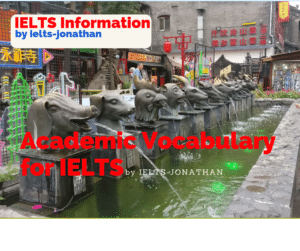IELTS Vocabulary to learn – Week 3
Writing from Taiyuan, Shanxi Province in China, this week students have been working on structuring their writing in terms or organisation, logic and use of linking words to signal progression and change throughout their essays and I’ve been lucky enough to visit some of the oldest Buddhist Pegodas in China as well as more modern areas of development.
This week on this course, there has been a short test on some of the most common vocabulary from the texts and listening we have been using, and I’d like to share these with you.
These are very common academic words, and can occur in any exam text or listening.
High Frequency IELTS Words
As they are high frequency words, then they can occur in the IELTS test too.
You should also be able to use these words in speaking and writing, so pay attention to their meaning and check the pronunciation.
I’ve provided a mini quiz for you to consider at the end too.
Vocabulary to learn – week 3
This week, you need to study the words but give examples of their use yourself. These examples, should not come from the texts/listenings/example essay, but they should be your own examples. Submit your example sentences to your teacher on the first day of week 4. There will also be a test.
|
Word |
Definition/synonym |
|
area (n) |
1. a region of a country or city 2. a part of a subject or activity |
|
complex (adj) |
Involving a lot of different but connected parts in a way that is difficult to understand. |
|
expand (v) |
To increase in size or amount, or to make something increase. |
|
sector (n) |
One part of a country’s economy. |
|
document (v) |
To support an opinion, argument etc. with recorded facts. |
|
perceive (v) |
To think of something or someone in a particular way. |
|
approximately (adv) |
Close to a particular number or time although not exactly that number or time. |
|
adequate (adj) |
Enough in quantity or of a good enough quality for a particular purpose. |
|
conversely (adv) |
Used to introduce something that is different to something you have just said. |
|
legally (adv) |
Allowed by law. |
|
investment (n) |
The money that you put in a bank, business, etc in order to make a profit, or the act of doing this (Make an investment). |
|
method (n) |
A way of doing something, often one that involves a system or plan. |
|
regulation (n) |
An official rule that controls how something is done. |
|
emerge (v) |
To become known. |
|
adapt (v) |
To change something so that it is suitable for a different use or situation. |
|
sum (n) (money) |
An amount of money. |
|
find (v) (to learn something by study) |
To discover or learn something by study, tests, sums etc. |
|
facilitate (v) |
To make something possible or easier. |
|
conduct (v) |
To organize or do something. |
|
exclusively (adv) |
only |
If you are confident you know these words, you can try and complete this mini test. You can do this in your head, or on paper.
IELTS Vocabulary Test
Vocabulary quiz week 3 (For first day of week 4)
Part 1: Dictation
Write down the words you hear and their part of speech (noun/adjective/verb/adverb etc.)
1.
2.
3.
4.
5.
Part 2: Comprehension
- Use the correct words in the box below in the following sentences. The words in the box are given in their base forms, you may need to add tense, a 3rd person singular s on verbs, or a plural marker on nouns.
Area, expand, document, legally, regulation, find, approximately, conversely
- There are many of study that are concerned with environmental protection these days.
- The study various aspects of Chinese life in this period.
- The staff of any organisation are its best ambassadors or may be its worst.
- People in Britain reach adulthood at 18.
- They their retail operations during the 1980s.
- I don’t think we should our business in the current economic climate.
- In 1992 the population of Cairo was 6,500,000.
- The correct procedure is laid down in the rules and .
- The study that 60% of small and mid-sized firms in and around Paris reported a drop in sales since the strikes began.
Total: /14
and here are the answers
I’m Jonathan
I’ve taught IELTS and University English in more than a dozen universities and schools around the world.
I’m a parent, traveller and passionate about language teaching and helping students achieve their dreams.
Whilst living in Austria or working in Asia, I run IELTS courses to help students get to where they want to be.
If you are serious about IELTS, connect with me to see how I can help you.



